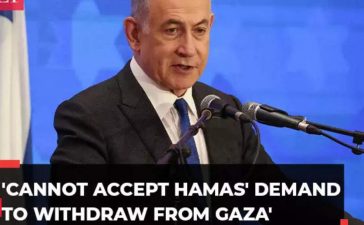The case brought by Nicaragua against Germany at the international court of justice (ICJ) in The Hague this week is a powerful example of the unprecedented political impact that the Gaza conflict is having around the world. Most obviously, Israel’s continuing assault after the 1,200 brutal murders and about 240 kidnappings by Hamas on 7 October has had a deadly impact on Palestinians. More than 30,000 people in Gaza have been killed, and a famine is now looming. The conflict has also opened up a division between the global north and south in a way not seen before.
Nicaragua’s case focuses on Germany’s supply of arms to Israel – the country supplied more than €326m (£258m) last year, which equated to more than a quarter of Israel’s military imports. It also calls on Germany to restore Gaza funding to Unrwa, the UN agency that provides Palestinians with humanitarian aid. Nicaragua says the arms sales mean Germany is “facilitating” genocide. On Monday, it accused Germany of doing “business as usual – or better than usual” because of its burgeoning weapons sales.
Germany, which is due to respond today, says Israel has breached “neither the genocide convention nor international humanitarian law” and that it remains “calm”. In some respects, its calmness is justified: Nicaragua’s accusation of complicity in genocide sets a high burden of proof. But Germany is under pressure, too. After 7 October, chancellor Olaf Scholz said that “there is only one place for Germany: at Israel’s side”. It was, he said, “a perpetual task for us to stand up for the security of the state of Israel”.
The good intentions that underlie that philosophy – Israel as Germany’s “raison d’état”, in the words of Scholz’s predecessor Angela Merkel – are clear. But Germany’s unquestioning support for Israel is becoming increasingly difficult to sustain. Germany sees itself as a global voice for human rights, yet it has continued to sell arms to Israel, and has silenced the voices of Jewish people and members of the public who have condemned the Israeli assault. Nicaragua’s court challenge puts this into sharp perspective.
South Africa’s case at the ICJ in January challenged one taboo by accusing Israel itself of inciting or committing genocide – a word created by Raphael Lemkin, a Polish-Jewish lawyer, in 1944 in direct response to the Holocaust. This week, Nicaragua is challenging another taboo by suggesting that Germany, whose very identity is built around taking responsibility for that earlier genocide, is now paving the way for that same crime. As Der Spiegel puts it: “Germany’s international reputation, after all, is partially based on the fact that it has drawn credible lessons from its criminal past … But since 7 October, accusations have been swirling that Berlin is applying a double standard.”
German opinion polls have swung dramatically in ways that no politician can ignore. Critics of the Gaza assault have more than doubled to 69%; support for Israel’s conduct of the war has collapsed to just 18%. Almost nine in 10 Germans now think there should be more pressure on Israel. Germany’s Green foreign minister, Annalena Baerbock, sounded impatient when she said that aid must immediately get into Gaza with “no more excuses”. The Social Democrat Scholz has begun to sound critical, too, asking on a visit to Israel last month: “No matter how important the goal, can it justify such terribly high costs? Or are there other ways to achieve your goal?” German lawyers have brought a case calling for Germany to end its arms sales to Israel. Britain and other governments are facing the same pressures, while a Dutch court found a “clear risk” that exported F-35 jet parts could be used in breaches of international humanitarian law.
Nicaragua is hardly a poster child when it comes to respect for human rights. Its 78-year-old president, Daniel Ortega, seen as a liberal darling when rebels defeated a dictatorship 45 years ago, presides over what a recent UN report described as “serious systematic human rights violations, tantamount to crimes against humanity”, including “a spiral of violence marked by the persecution of all forms of political opposition”. Nicaragua was one of just four governments – along with Syria, North Korea and Belarus – that backed Russia’s illegal annexation of eastern Ukraine in 2022.
But Nicaragua’s hypocrisy on human rights doesn’t take away from the double standards that Germany and others have displayed. The UN security council remains a lost cause for enforcing human rights because of America’s continuing veto mindset (a matching pair to Moscow’s veto on Syria). The ICJ is therefore becoming a place where pressure can be exerted. Some of that pressure is on Israel itself. But especially susceptible are those governments that are caught between a rock and a judicially hard place – reluctant to argue with Israel, but equally eager not to pick fights with the world court, whose other current cases include Ukraine and potential genocide in Myanmar.
This week’s Nicaragua case is one of three Israel cases all running in parallel in The Hague (four, if you count the international criminal court, which recently appointed a former British military prosecutor to lead its Gaza investigations). In February, the ICJ held hearings on the request from the UN general assembly to examine the legal consequences arising from Israeli policies in the occupied territories. Last month, the court followed up on its January finding of a “plausible” risk of genocide, in response to the case brought by South Africa. (South Africa, too, is selective about whose human rights it cares about; Pretoria has rolled out the red carpet for a Sudanese warlord accused of grave war crimes.) In their most recent rulings, judges unanimously demanded the “unhindered provision at scale” of humanitarian aid in Gaza, and also demanded, by a majority of fifteen to one, that Israel ensure “with immediate effect” that its military does not commit acts of genocide.
Cumulatively, these court cases, thousands of miles from New York, are a reminder that the rules of geopolitics have changed. Once upon a time, western governments could always be confident of protecting their friends, no matter what crimes they were alleged to have committed. As this week’s hearings remind us, those days are gone.
-
Steve Crawshaw, a former UK director of Human Rights Watch, is writing a book on war crimes and justice
-
Do you have an opinion on the issues raised in this article? If you would like to submit a response of up to 300 words by email to be considered for publication in our letters section, please click here.











